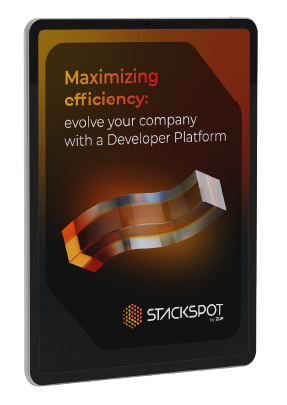What benefits and challenges come to mind when discussing a platform engineering team? What do we mean by this team structure?
This article explains the concept, best practices, and how to have a successful platform engineering team.
What is a platform team?
The platform team is responsible for establishing the company’s technological foundations. In other words, it is the team that defines, configures, implements, and maintains the company’s technology —in this case, a platform that supports development and centralizes information and standards used by the technology teams.
The team plays a fundamental role in providing infrastructure and tools for developers to work efficiently and effectively alongside other teams, such as DevOps.
What is a platform team in software engineering?
In software engineering, platform teams became necessary with the migration of applications to the cloud. This transition required a standardized and scalable infrastructure to support development in this new environment.
For this reason, platform engineering primarily focuses on developing and maintaining the underlying platform and infrastructure. Thus, the platform team will design and build applications’ tools, structures, and systems.
In a recent survey by Gartner, 75% of the participants said their organizations have already embraced Platform Engineering, but only 44% have formalized and structured approaches.
Consume innovation, begin transformation
Subscribe to our newsletter to stay updated on the latest best practices for leveraging technology to drive business impact
Best practices for a platform team
The best practices for a platform engineering team are linked to mature management that empowers the team to deliver constant results.
According to the Gartner Top Strategic Technology Trends 2024 survey, by 2026, 80% of software engineering organizations will establish platform teams as internal providers of reusable services, components, and tools for delivering applications.
These are key requirements of a platform team:
Specialized skills and knowledge
The success of a platform team results from the combination of each member’s diverse skills and knowledge, such as mastery of areas like cloud computing, automation, DevOps, and programming languages like Python and Java.
In addition, the real edge comes from mature knowledge of parallel areas, such as commercial, data structure, algorithms, and system design, and an understanding of customer needs.
Team culture
Platform engineering teams must have a strong culture of collaboration and mutual respect. Hence, open communication, responsibility, and trust are the pillars of the operation. These teams should regard mistakes as opportunities for learning and continuous improvement.
Agility and adaptability
Platform engineering teams often initiate changes rather than just responding to them. As such, they must adapt quickly to new technologies, methodologies, and market trends without compromising quality or efficiency.
Encouraging innovation
The innovation mindset is the lifeblood of platform engineering teams. They experiment fearlessly, adopting a fail-fast approach to keep their products relevant and competitive.
What it takes to be a successful platform team
A successful platform team depends on the balance between teamwork, DevOps, security, and adaptation. Learn more about each of these aspects:
- Teamwork: having a team of professionals with a potent combination of technical skills, creativity, and the ability to communicate effectively.
- Adopting a DevOps culture: promoting collaboration and communication between teams. DevOps will reduce silos, minimize bottlenecks, and speed up software delivery. Conversely, platform engineering teams that embrace the culture deliver high-quality products faster and with fewer errors.
- Adopt automation: It’s important to emphasize the significance of automation, even within the existing DevOps culture. After all, it eliminates manual tasks, reduces errors, reduces cognitive overload, and allows team members to focus on more complex and valuable tasks.
- Emphasis on security: understanding the possible risks and severe consequences of application vulnerabilities and prioritizing secure development. This means incorporating good security practices into all phases of the development process — known as DevSecOps.
- Constant learning and adaptation: balancing knowledge of the latest trends and a sustainable work pace.
Importantly, there is no one-size-fits-all approach; each team will face its own challenges and opportunities. The key is to remain flexible, learn continuously, and adapt as necessary.
Creating a platform engineering team
We’ve already learned about the importance of platform engineering teams and what they do, but how to create such a team in your company?
1 – Shared vision
Beyond bringing together a group of qualified professionals, it is crucial to align everyone around a shared vision, whether strategic or technical. Without this, your team may struggle to stay focused, and their efforts may not be consistent with the expected outcomes.
2 – Ongoing training
Technology, evolution, and innovation go hand in hand, and platform engineering teams must keep up with these changes. In other words, training should be ongoing, including refresher courses, to ensure that the team remains up to date in their field.
3 – Define clear roles
In a platform engineering team, all members must clearly understand their roles and responsibilities. Without clarity, task may get lost or done twice, leading to frustration and higher development costs.
4 – Value the collective
If an engineer is a great problem solver and drives the team’s success, overloading this person can be risky and unsustainable. It is essential to distribute tasks evenly and to promote a culture where everyone feels valued and important.
5 – Maintain scalability
It is paramount to keep scalability in mind when building a platform team. After all, your team must scale its efforts to accommodate its workload, meeting deadlines without compromising quality.
Modernizing legacy systems can be challenging, but a Developer Platform can solve this. Watch the video and learn how.
Challenges of a platform engineering team
Despite their multiple benefits, platform engineering teams also face challenges, some of which are worth highlighting:
- Maintaining a high level of specialization requires a commitment to ongoing learning, which can be exhausting in the long term.
- Collaboration to achieve success must be carefully managed to avoid communication breakdowns.
- The relentless pursuit of innovation can result in burnout, and agility often comes at a cost in terms of stability and predictability.
- The management and evolution of the Developer Platform is also a challenge for these teams.
The success of platform engineering teams hinges on the balance between technical prowess and interpersonal skills. This equilibrium fosters innovation, speed, quality, and collaboration.
Want to learn more about patterns and anti-patterns in platform engineering? Then, this article is for you.
Navigating successful metrics
Metrics are not just indicators but guidelines for shaping the future of the team, the platform, and the company. Ultimately, they reveal strengths and areas for improvement, empowering the team to take action.
Metric 1: Adoption and use
The first metric is the degree to which the service or product is adopted and used by people. For example, high demand says a lot about quality, reliability, and usefulness; the opposite could also indicate a problem. Analyze:
- number of consumers,
- frequency of use,
- diversity of consumers.
Metric 2: Service reliability
Reliability hinges on the platform’s robustness and the team’s ability to uphold high service levels. This is why downtime is costly, both financially and in terms of reputation.
Here, you should look at two metrics:
- Service Level Indicators (SLIs): real numbers about a team’s performance;
- Service Level Objectives (SLOs): objectives that a team needs to achieve.
Metric 3: Innovation and improvement
If innovation is the driving force behind platform engineering, it should similarly inspire your teams. Continuous innovation and improvement are hallmarks of effectiveness — whether through adopting new technologies or optimizing existing ones.
In this case, monitor the implementation of new features, improve existing services and reduce technical debt. When it comes to technology, it is essential to keep moving forward while maintaining what already exists.
Metric 4: Customer satisfaction
In platform engineering, customers are the internal teams who use the platform’s services. As such, getting regular feedback from these teams, analyzing their satisfaction levels and whether they are hitting targets are basic indicators of effectiveness.
Remember: the platform engineering team exists precisely to train other teams. If client teams are satisfied and hitting their targets, it is proof of success.
Conclusion
In this article, we’ve covered numerous topics to help readers understand platform engineering teams — from their concept to how to evaluate their performance.
You have gained insights into their challenges and that success in platform engineering is not guaranteed. That’s why it’s crucial to acknowledge common mistakes and proactively prevent them.
It is essential to have a team focused on technical advancement, a strong culture, agility to solve problems, and a commitment to innovation.
At this point, continuous training, valuing the collective, scalability, and strategic vision will be the foundations for achieving the desired outcome: the success of the team, the platform, and the company.
Would you like to learn more about our development platform? Talk to our team of experts.












